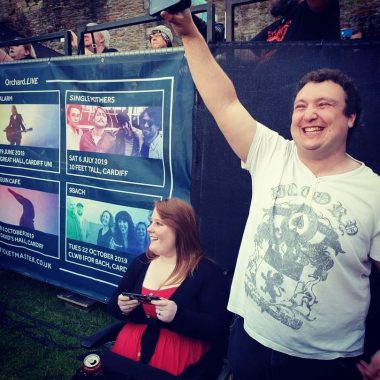The Furious Fire of Heat Sensitivity
Written by |

“In order to rise from its own ashes, a phoenix must first burn.” — Octavia E. Butler
You know that feeling of waking up in a strange place, and it takes a second to remember where you are? Imagine that coupled with not being able to move from the neck down.
Flashback to flames
A dark and dreary day dawned on the morning of Feb. 20, 2018. I was in a hotel room with my mother and sister. It was the start of my second day of the first round of Lemtrada (alemtuzumab) infusions, the disease-modifying treatment I underwent to wage war against my aggressive onset relapsing-remitting MS. Lemtrada, so far, has been winning the battle.
Half asleep, I attempted to go to the bathroom. The problem was that I didn’t realize I couldn’t move from the neck down. I couldn’t feel my body. I’d overheated while I was asleep, and my body felt like lava, despite the temperature control medication I’d taken to ameliorate the side effects of the infusion.
The next thing I knew, I was slipping off the crisp hotel sheets. By now, my distress had awakened my sister. She lifted me back onto the bed. Being a midwife, she was well versed with patient maneuvers. Then, after building a wall of pillows so I didn’t accidentally slide off again, she draped me with doused towels from the bathroom to cool me down.
At the time, I had consistent neuropathic issues all over my body, including numbness, burning, and wet sensations. I was also not a stranger to fatigue, both cognitive and physical. The thorn in my side, however, was that I was at the beginning of a disabling relapse that proceeded to paralyze me from the waist down.
I was a stranger to how significant temperature change is on my symptoms, and this wasn’t a pleasant way to be introduced to it. I was effectively carried to the car to embark on my second of five days of infusions. When I say that I walked into Lemtrada and wheeled out, I’m not exaggerating. This was the frustrating introduction to my newfound relationship with my wheelchair.
Temperature change and my revolution
Yet just like most of my other symptoms, my body’s reaction to heat sensitivity has evolved. That fateful day was rock bottom. I do still experience heat sensitivity, albeit in a different way. Whereas all it used to take was any heat increase, such as from a duvet, a hot summer’s day, a bath slightly too warm, or even a hot hand on my arm to trigger a cascade of symptoms, now it’s swift temperature change that affects me more.
The evolution of my heat sensitivity has developed synonymously with anxiety because it originally triggered my bladder incontinence the most, which is easily the most embarrassing symptom. I’d have no notice to need the bathroom, let alone getting there on time in a wheelchair. Sometimes I couldn’t even feel it happening. A 30-minute car journey on a hot day became unthinkable. The reality of having to use incontinence underwear at 27 years old felt incredibly demeaning, as though I were shedding layers of dignity.
Serendipity
The turning point was at a Black Stone Cherry concert at the stunning Caerphilly Castle in South Wales. It was midsummer and hot by the U.K.’s standards. We’d driven over two hours. About 300 people were attending, and there was one standalone disabled “portaloo” toilet at the back of the venue.
The moment of clarity struck. After using the rudimentary portaloo’s facilities to clean myself up after being forced to wait, I asked myself the question, “Am I going to let this ruin today?”
“No.” That was the clear moment of serendipity.

Beth, in a wheelchair, and her husband, David, attend a Black Stone Cherry concert at a South Wales castle in 2019. (Photo by Amy Kelham)
I’ve learned it’s about regulating my environment and learning my triggers. Managing heat sensitivity involves fans and lots of ice and cool drinks in the summer and consistent heating in the winter. Of course, you can’t regulate Mother Nature. Changeable weather, as the U.K. has seen this past week, has a profound impact. The cold spell we’ve had caused me to change my duvet for a warmer one. That was a mistake. I couldn’t move the next morning, and I still feel somewhat like I’m walking on stilts.
The silver lining I choose to focus on is that the baseline of my symptoms has improved since 2018. I am rising up out of my dreaded heat intolerance, and that is the most important thing.
Note: Multiple Sclerosis News Today is strictly a news and information website about the disease. It does not provide medical advice, diagnosis, or treatment. This content is not intended to be a substitute for professional medical advice, diagnosis, or treatment. Always seek the advice of your physician or other qualified health provider with any questions you may have regarding a medical condition. Never disregard professional medical advice or delay in seeking it because of something you have read on this website. The opinions expressed in this column are not those of Multiple Sclerosis News Today or its parent company, Bionews, and are intended to spark discussion about issues pertaining to multiple sclerosis.

iris prusky
unfortunately all the above symptoms of Beth occured to my son, 50, who was diagnosed with MS last year. since then the burning sensation doesnt stop annoying his legs, from the bottom of the feet & up. he is suffering a lot, taking pills that dont help the feeling. He is taking Vumerity since half a year but we see no improvement. He also has the symptoms of unloading several times per night, and his mood changes quite often, when will there be a cure for this horrible disease.Since when did the scientists start to look into a cure???? why cant it be cured and why is the medications have many side effects?
Beth Ullah
Hi Iris,
Thanks for your comment. I entirely understand your frustration with this condition. It's called "the snowflake disease" for a reason, unfortunately. No two cases will be the same. This is the issue with how medications work. For me, my neuropathic pain/sensations, spasms, and spasticity all interact very delicately, so if I take a medication to ease spasms, I find it increases my weakness as a result.
I would encourage him to maybe go and have a conversation about trying something new for his neuropathic issues. As what he's on aren't working, however some do take time. I have written previously about my experience with symptom relief and medication, which may be of interest... As for vumerity, the main aim for disease modifying treatment is to prevent further damage which it may well be doing in the background. The problem then is managing symptoms you already have. For instance, my first symptom was numbness from my chest to my feet, that has never gone away, for me.
I can't say if there will ever be a cure, the problem is there isn't just one cause for this, as you quite rightly say, horrible disease. This makes finding a cure difficult. I can say, that the research has come on leaps and bounds in the last 5 or so years, which gives hope for the future